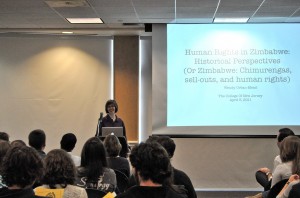By Joshua Fidler
Correspondent

Many know about Nelson Mandela and the segregational Apartheid system in South Africa. The story of Robert Mugabe and the violence of Zimbabwe, recounted at a lecture on April 5, is equally compelling, if less well known.
Wendy Urban-Mead, professor of history at Bard College, discussed the history of Zimbabwe at her lecture, “Human Rights in Zimbabwe: Historical Perspective,” held in the Business Building lounge.
Zimbabwe, up until the 1980s, had a similar history to that of South Africa, she said. Zimbabwe was part of the British Colony of Rhodesia, and it was dominated mainly by white people.
The people of Zimbabwe have had three Chimurengas, a Shona word which means “struggle,” according to Urban-Mead. The people wanted to “struggle to throw off oppression,” she said.
The guest speaker detailed the sequence of Chimurengas that changed Zimbabwe. The first Chimurenga occurred when Cecil Rhodes and the British first conquered the Shona, a collection of ethnic groups in Zimbabwe and Mozambique. The second Chimurenga lasted from 1972 to 1978. The Zimbabwean people fought to retrieve their land, which they regarded as “the mother of your people,” according to Urban-Mead. This conflict resulted in the rise to power of Robert Mugabe and the ZANU party.
From 1982 to 1987, a time when much of the world was watching Nelson Mandela’s civil rights action in South Africa, Robert Mugabe sent out the Fifth Brigade.
The goal of the Fifth Brigade was to eliminate ZAPU, the opposition party in Zimbabwe. According to Urban-Mead, approximately 20,000 people were thought to have died in the violence that ensured, but in reality it was “probably more,” she said.
The 1999 death of Joshua Nkomo, a Mandela-like figure known as “father Zimbabwe,” led to the third Chimurenga, Urban-Mead said. This Chimurenga resulted in the forceful seizure of white-controlled farms.
But the people who took over control of the farms were not prepared to continue the work, which resulted in widespread food shortages — “Weimar Germany times a million,” she said.
In the last seven years there have been several violations of human rights. In 2005, the government launched a Murambatsvina, or urban clearing campaign, Urban-Mead said, displacing 700,000 people who worked on the streets of Zimbabwean cities.
With 2008 came new elections, but no new changes. The opposition party won the election, but the army, loyal to Mugabe, retained Mugabe’s power with intimidation, Urban-Mead said.
Though another election is scheduled for 2011, already “a fresh round of arrests and intimidation have begun,” she said.
Urban-Mead also discussed Zimbabwe’s major AIDS problem. The life expectancy in 1990 was 60, and today has decreased to 34 years, she said.
The most-important thing that students can do to help the situation is “get informed,” Urban-Mead said.
“(It’s important to) make an effort to understand what goes on in lesser-known countries, because they make an impact,” said Brian Furman, a junior international studies and psychology double major.






